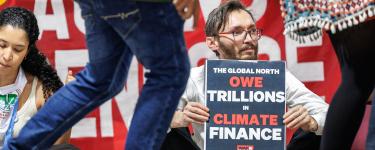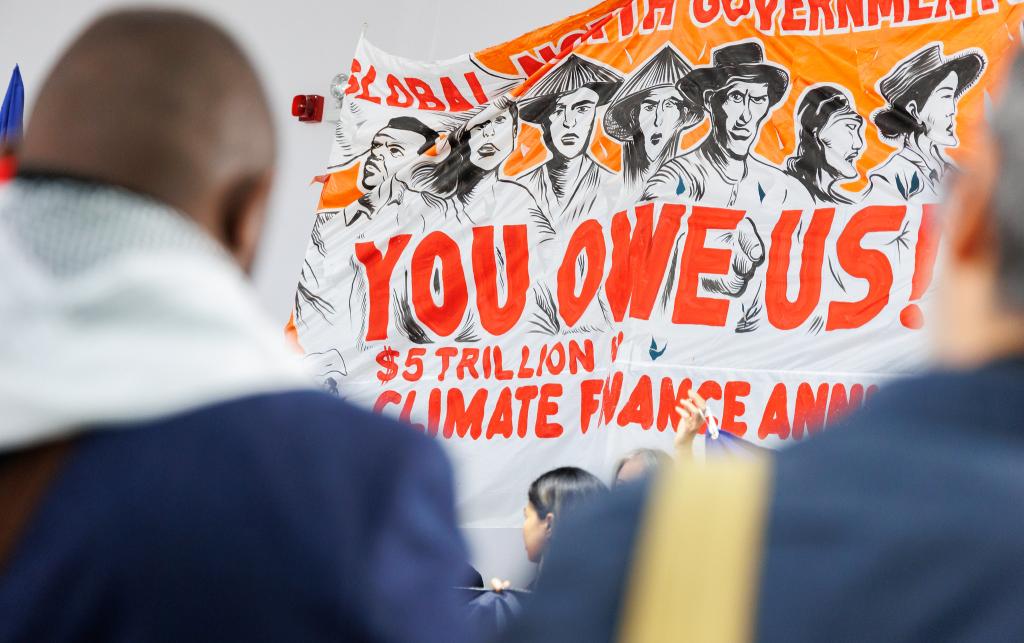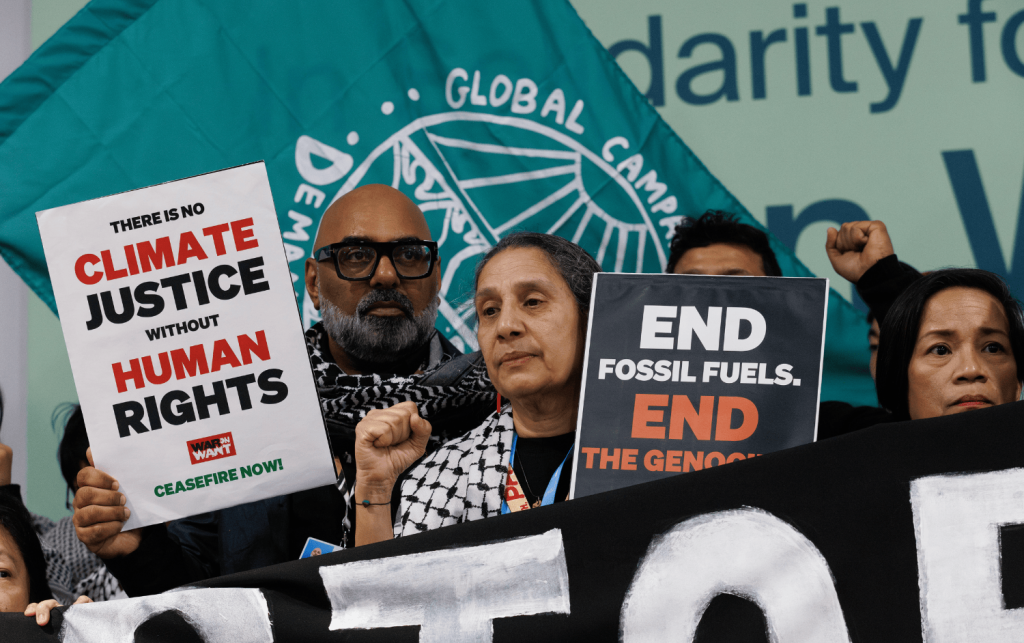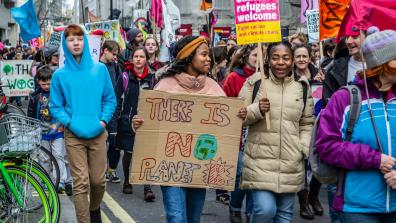COP29 climate talks fail Global South – but there’s hope

The UN Climate Summit COP29 (11 – 22 Nov 2024) ended in failure. Overshadowed by the re-election of Donald Trump as US President – who announced the US will withdraw from global climate efforts – the future of our planet has been put at risk by the US and Global North politicians.
While claiming to be ‘climate leaders’, the UK and other Global North countries refused to pay up their climate debts (the money owed to the Global South for causing the climate crisis), and actively sabotaged international collaboration on the climate. These actions undermined hope of a just transition away from economies powered by deadly fossil fuels, to greener, fairer economies and societies; and the principles of worldwide rules and agreements.
Meanwhile, Global North countries continue to arm and support Israel, while it commits a genocide of the Palestinian people. By failing to end their complicity with Israel’s genocide, Global North countries are actively undermining international law – and global institutions such as the United Nations.1
The message is clear: only by coming together as people, to build our collective power and make the governments we elect hear us, can we create a future where everyone can live with dignity, in harmony with the planet.
Do the COP climate talks still matter?
Whilst many Global North governments, such as the US, were intent on undermining the COP29 climate talks, as were the 1,733 fossil fuel lobbyists in attendance (outnumbering delegations from almost every country); the climate crisis is a global problem, requiring global cooperation and global solutions. The UN Climate Summit remains one of the few opportunities for the voices of not only every country to be heard, no matter how small, but for civil society – affected communities, activists, advocacy groups, trade unions – to hold powerful countries to account for their policies, while putting forward solutions that will benefit both people and planet.

Three takeaways from COP29:
1. $300 billion is not enough
The UN has estimated that Global South countries will need at least $5 trillion in non-debt creating money per year, to account for past harms and address future climate breakdown. The money is there, but Global North countries are pouring it into destructive military spending and support for fossil fuels, rather than paying their climate debts.2
COP29 saw just $300 billion pledged by Global North countries, including the UK, to be delivered by 2035. When adjusted for inflation, $300 billion is not much more than the $100 billion promised, but not delivered, 10 years ago at COP15. And this is nowhere near the $5 trillion needed.
The majority of the $300 billion pledged will be delivered via debt-creating loans, and ‘private finance’ (vague finance promises from private financial institutions, such as banks, seeking to make a profit from their investments), rather than public funding; leaving Global South countries already struggling with debt to shoulder even more of it. The result? Billions of people will lose their homes, livelihoods – and lives – as the climate crisis intensifies, and without the extent of the money needed to deal with climate breakdown.
Worse still, the vague goal of $1.3 trillion to Global South countries lacks any details or commitments. The sources of this money, minus the $300 billion, are yet to be agreed.
War on Want stands in solidarity with Global South governments that rejected the outcome of the COP29 talks. The fight for the trillions of climate finance needed continues.
2. Just transition deal sabotaged
To tackle climate collapse and political instability, a restructuring of the global economy is needed, through a just transition away from fossil fuels and our industrial food system to greener, fairer societies. This is War on Want’s vision of a Global Green New Deal, a comprehensive vision to tackle the climate crisis and global inequality, protecting both people and the planet.
At COP29, civil society – activists, feminists, Indigenous peoples and trade unions – including War on Want – emphasised the urgent need to transition our economies in a just, fair way that protects peoples’ livelihoods and biodiversity. Rich Global North countries sabotaged discussions by trying to remove the long-agreed climate crisis ‘Common but Differentiated Responsibilities’ principle (CBDR); which takes into consideration countries’ differing abilities and responsibilities to take action for the climate. CBDR is based on an assessment of which countries have contributed the most to cause climate breakdown, through the highest greenhouse gas emissions. Countries which have done more to cause the climate crisis must provide finance and technology to assist Global South countries to transition fairly.
Governments must make deeper and faster emissions cuts if we are going to meet the narrow window for stopping runaway climate collapse. Looking ahead, next year’s UN climate talks in Brazil (COP30) will focus on agreeing policies that will determine the future of our economies – and if the world will adopt more ambitious targets to cut carbon pollution.

3. No climate justice without human rights
Since October 2023, Israel’s genocide of the Palestinian people has killed over 43,000 Palestinians across the Gaza Strip—over half of them children— injured 103,000, and displaced 1.9 million people, as of November 2024. The International Criminal Court has issued arrest warrants for Israel’s Prime Minister Benjamin Netanyahu and former Defence Minister Yoav Gallant, for crimes against humanity and war crimes against the Palestinian people. Israel is also carrying out ecocide3: the deliberate destruction of land and resources essential for survival. Yet the UK and other Global North countries are failing to uphold international law and human rights by holding Israel to account – instead arming and supporting Israel.
The Global North is willing not only to enable Israel’s genocide of Palestinians, but to undermine international law and the institutions that could hold Israel to account – such as the International Court of Justice. International institutions are essential for the global cooperation needed to protect billions of people across the Global South on the frontlines of climate breakdown – fires, floods, typhoons – as the world heats up.
For a liveable future planet, governments must uphold human rights, enforce international law, divest from fossil fuels and military spending – indeed, from genocide – and instead invest in a just transition to fairer, greener societies.
The fight ahead
In 2025, the UK must submit its new climate action targets to the UN climate body. Although the UK wants to be seen as a climate leader, it handed out over 80 oil and gas licences this year, resulting in an estimated 101 million tonnes of planet-heating emissions—a 50-year high.
The UK must do its fair share of action on the climate by transitioning to ‘real zero’ by 20304: this means it must eliminate greenhouse gas emissions entirely, without relying on false so-called ‘solutions’ such as carbon offsets 5– in reality a licence to carry on polluting.
Additionally, the UK must support the UN Tax Convention6 and implement a wealth tax on the richest 1%, who have captured two-thirds of global wealth growth since 2020. International trade rules must be reformed, to ensure Global South countries can access the technologies needed to deliver renewable energy, such as wind and solar power, which are currently locked away behind restrictive patents – as Covid-19 vaccines were during the recent pandemic. Countries must also not be penalised for decarbonising.
Following the failure of COP29, our future hangs in the balance. We must fix broken economic systems, move away from fossil fuels, and create fair societies by ensuring good jobs, fair wages, and public services for all. Protecting ecosystems and stopping destructive resource use are vital. Only true global cooperation will allow us to live with dignity and harmony with our planet.
Header image: UN Climate Change, Habib Samadov








